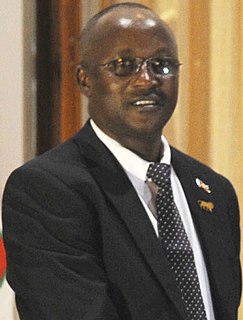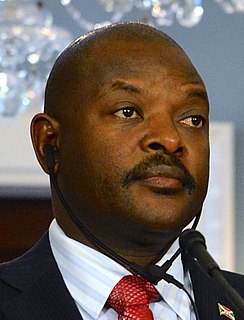
Politics of Burundi takes place in a framework of a transitional presidential representative democratic republic, whereby the President of Burundi is both head of state and head of government, and of a multi-party system. Executive power is exercised by the government. Legislative power is vested in both the government and the two chambers of parliament, the Senate and the National Assembly.

The President of Burundi, officially the President of the Republic, is the head of state and head of government of the Republic of Burundi. The president is also commander-in-chief of the National Defence Force. The office of the presidency was established when Michel Micombero declared Burundi a republic on 28 November 1966. The first constitution to specify the powers and duties of the president was the constitution of 1974 adopted in 1976. The constitution, written by Micombero, affirmed Micombero's position as the first president of Burundi. The powers of the president currently derive from the 2005 constitution implemented as a result of the 2000 Arusha Accords after the Burundian Civil War. The current president is Pierre Nkurunziza, who has held office since being elected first president of the post-transition republic on 19 August 2005.
Domitien Ndayizeye is a Burundian politician who was President of Burundi from 2003 to 2005. He succeeded Pierre Buyoya, as president on 30 April 2003, after serving as Buyoya's vice president for 18 months. Ndayizeye remained in office until succeeded by Pierre Nkurunziza on 26 August 2005.

This article lists the Prime Ministers of Burundi since the formation of the post of Prime Minister of Burundi in 1961, to its abolition in 1998.

The Senate is the upper chamber of Parliament in Burundi. It consists of no fewer than 37 and no more than 54 members who serve 5-year terms. The current Senate was elected on 24 July 2015 and consists of 43 members.

The position of Vice-President of the Republic of Burundi was created in June 1998, when a transitional constitution went into effect. It replaced the post of Prime Minister.

In 2007 the Government of Burundi consisted of a 20-member Council of Ministers appointed by the President. The Council of Ministers, together with the President and Vice-Presidents, forms the executive branch of government in the country.

Parliamentary elections were held in Burundi on 29 June 2015. The vote had been initially set for 5 June 2015, alongside local elections, but it was delayed due to unrest. Indirect elections to the Senate occurred on 24 July.

Presidential elections were held in Burundi on 21 July 2015. President Pierre Nkurunziza ran for a third term despite controversy over whether he was eligible to run again. The opposition boycotted the vote, and Nkurunziza won re-election.

On 25 April 2015, the ruling political party in Burundi, the National Council for the Defense of Democracy – Forces for the Defense of Democracy (CNDD-FDD), announced that the incumbent President of Burundi, Pierre Nkurunziza, would run for a third term in the 2015 presidential election. The announcement sparked protests by those opposed to Nkurunziza seeking a third term in office.
This article lists events from the year 2015 in the Republic of Burundi.
This article lists events from the year 2017 in Burundi.

Burundi–India relations refers to the international relations that exist between Burundi and India. Apart from bilateral relations, India also engages with Burundi through the African Union and the Regional Economic Communities (RECs).

Gaston Sindimwo is a Burundian politician, serving as the First Vice President of Burundi, under President Pierre Nkurunziza, since his inauguration on August 20, 2015. Sindimwo is also the Secretary-General of the Union for National Progress (UPRONA), and was previously the Deputy-Private Secretary at the Office of the First Vice-President.
This article lists events from the year 2019 in Burundi
This article lists events from the year 2018 in Burundi








